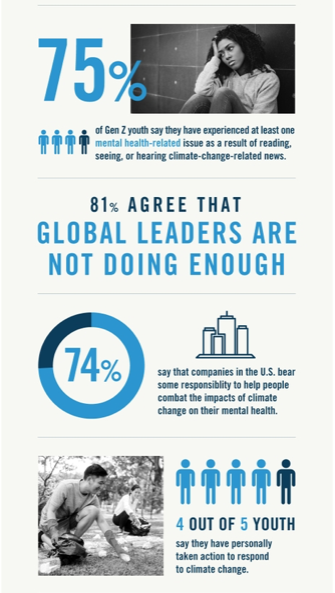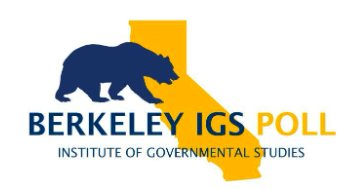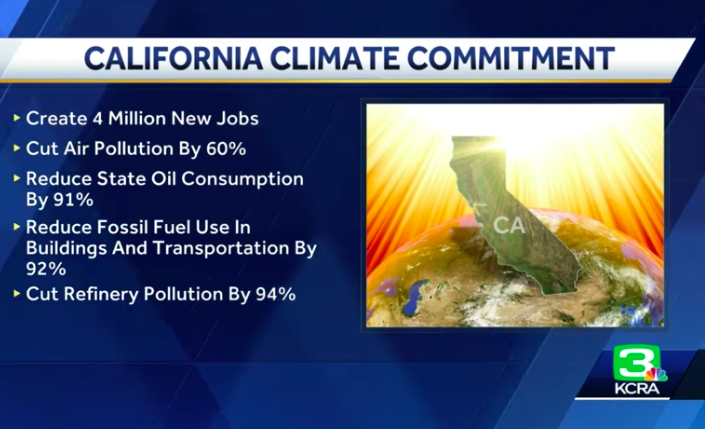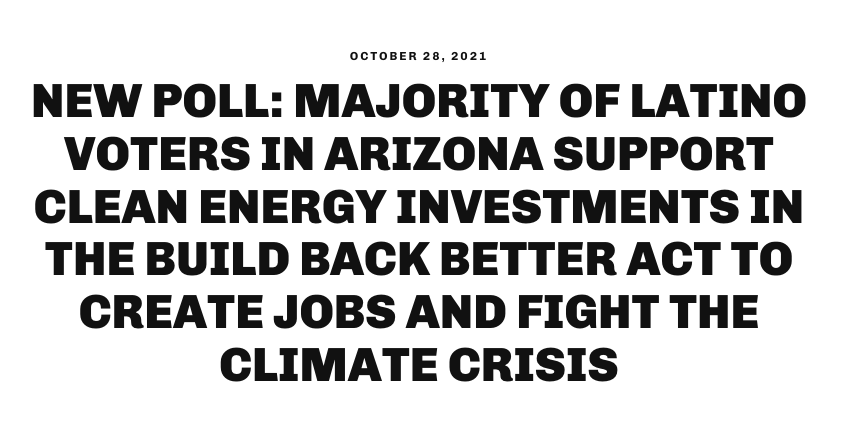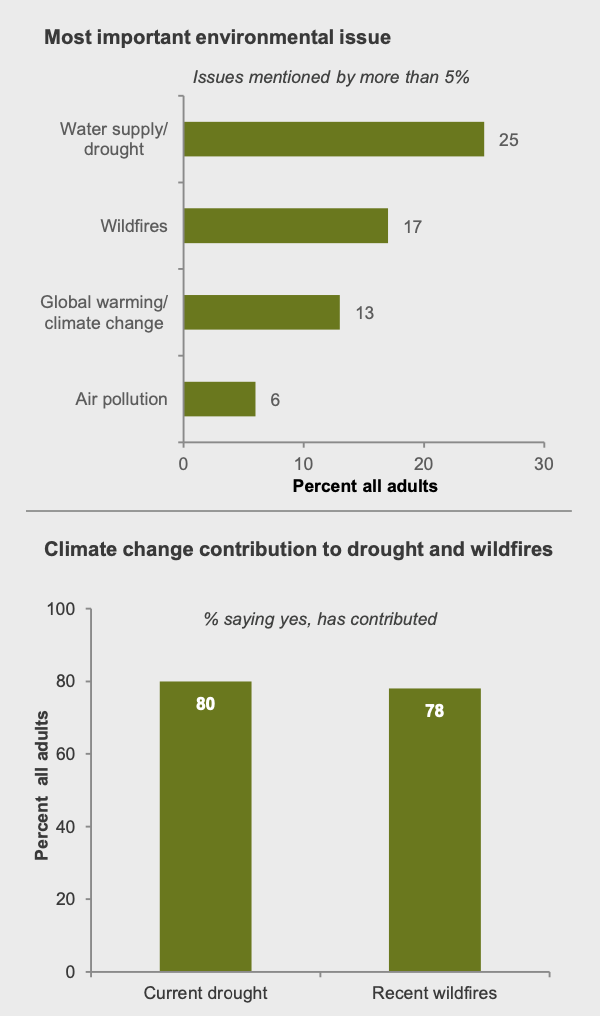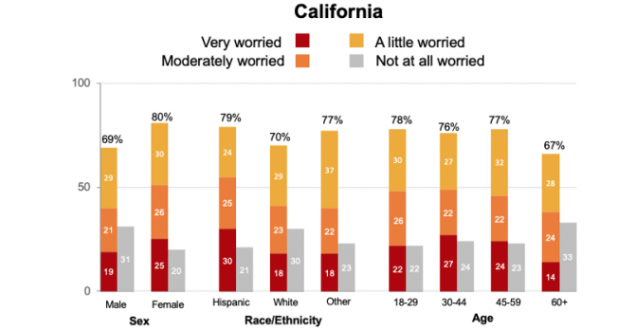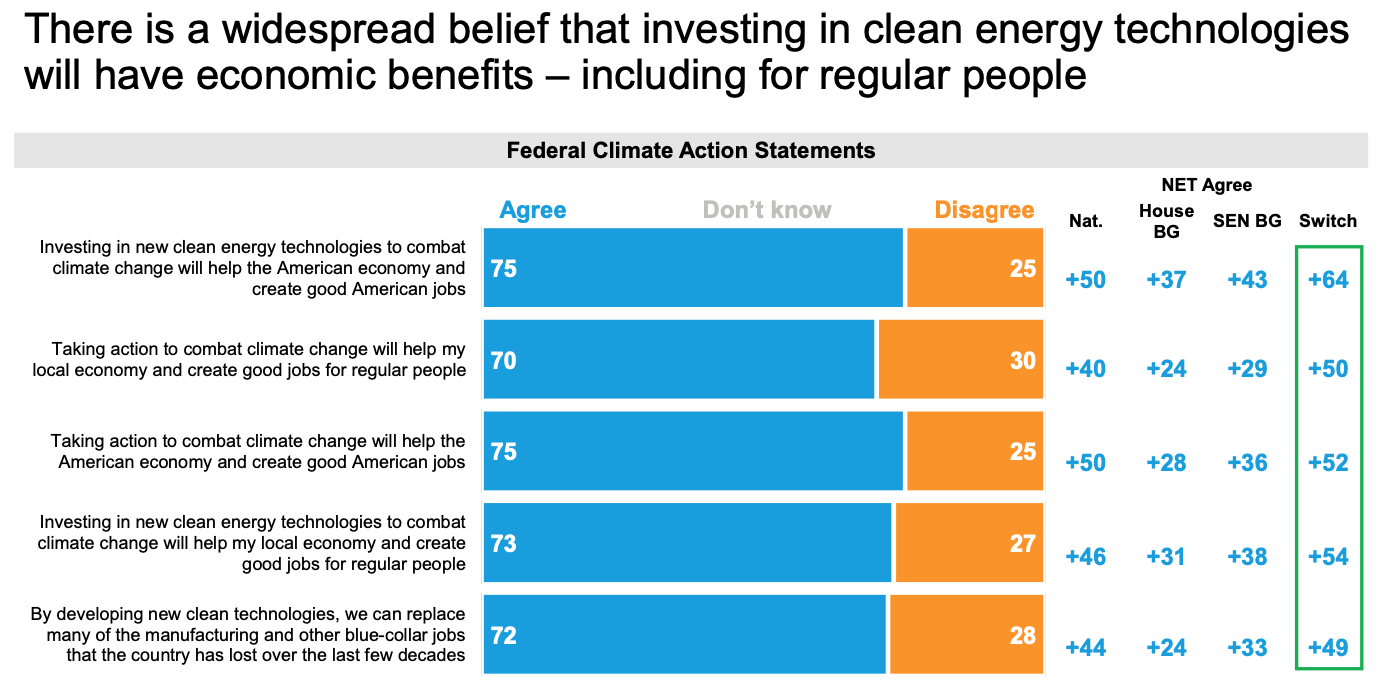Resources
Search below for resources covering the intersection of climate engagement, social science and data analytics.
RESULTS
Environmental Polling Roundup - April 22nd, 2022
This post includes climate and environment headlines, data points, and key takeaways from recent public polls - including new polling on clean energy investment as part of Biden’s economic plan; “direct pay” reforms to better incentivize clean energy production; electric vehicles and ethanol; and state-level polls in California and Massachusetts.
Poll: Climate change is taking a toll on Gen Z mental health while also inspiring youth to take action
A significant majority of Gen Z youth (75% nationwide, 80% in California) have experienced a mental health-related issue, such as anxiety, stress, and/or feelings of being overwhelmed as a result of reading, seeing, or hearing news about climate change.
- Despite these mental health challenges, four out of five youths (81% nationwide, 86% in California) say they have personally taken action to respond to climate change.
- Young people are stepping up to make a difference by relying less on plastic products (54% nationwide, 64% in California), reducing use of electricity (45% nationwide, 52% in California), and working to conserve water (38% nationwide, 53% in California).
- A vast majority of respondents (81% nationwide, 84% in California) agree that global leaders are not doing enough to combat climate change.
- Three quarters of youth (74% nationwide, 74% in California) say they agree that companies in the U.S. bear some responsibility to help people combat the impacts of climate change on their mental health.
- A majority (85% nationwide, 86% in California) believe it is important to support brands/companies that are sustainable and/or environmentally friendly.
Poll: Majorities see California’s changing climate as serious health and safety threats
Most California voters consider air pollution and extreme heat to be serious threats to the health and safety of their families; the majority also support the new state law requiring composting of all food waste. 64% of voters in the state say that extreme heat poses a “very” or “somewhat” serious threat to the health and safety of themselves and their family, and 63% say the same about air pollution. The poll also finds a great deal of support for the new California law requiring the composting of food waste in order to reduce pollution in landfills, with voters favoring the new policy by a 68%-24% margin.
The Green New Deal in the States – Part 2
California is one state that has made steps toward a state Green New Deal. As the deadline for legislation approached on the last evening of August, 2022, the California legislature passed five laws embodying major climate protection and justice measures, including restrictions on oil and gas drilling, 100% renewable energy by 2045, cutting overall emissions, extending the Diablo Canyon nuclear reactors, and legislation directing the California Air Resources Board to set regulations for carbon capture, utilization, and storage projects. Most of these policies were opposed by a coalition of business groups, including the California Business Roundtable and California Chamber of Commerce. They were joined by most building trade unions in a formal alliance called Common Ground which had helped kill previous climate legislation. Such opposition was overcome in part by Gov. Gavin Newsom’s last-minute decision to support the climate bills after staying quiet and not backing them until mid-August. Other states have also explored GND-style state policies in recent years, including Maine, New York, and Mississippi. California, Maine, Massachusetts, Oregon, Rhode Island, and Washington are also part of the Under2 Coalition which brings together over 270 sub-national governments representing 1.75 billion people and 50% of the global economy committed to climate protection policies.
Environmental Polling Roundup - November 5th, 2021
This post includes a roundup of climate + environment headlines, data points, and key takeaways from this week’s public polls - including fresh polling on the new Build Back Better framework and its core climate and energy provisions + analysis of climate polling trends throughout the year + new polling on attitudes about climate and clean energy among Latino voters in battleground states and districts.
Latino voters in battleground states and districts overwhelmingly support the Build Back Better plan’s climate and clean energy provisions. All of the 11 Build Back Better provisions tested in the poll have overwhelming support (76%+), and several climate and clean energy provisions rank among the most popular elements of the bill whether looking at overall net support or intensity (“strong support”). Particularly appealing provisions include: lowering energy costs by making homes, schools, buildings, and vehicles more energy efficient (89% total support, including 55% strong support); creating millions of additional clean energy jobs in fast-growing industries like wind and solar (87% total support, including 52% strong support); making oil and gas companies pay their fair share for the pollution they create (86% total support, including 55% strong support); providing tax incentives to make clean energy sources like wind and solar power widely available at lower costs (86% total support, including 51% strong support; rewarding electric utilities that generate more electricity from clean energy sources like wind and solar (85% total support, including 50% strong support). (The poll sampled Latino voters statewide in Arizona, Colorado, Florida, and Nevada, as well as Latino voters in competitive U.S. House districts in California and Texas).
Poll: Water Supply and Drought are Now Californians’ Top Environmental Concern
- Californians are most likely to say that the state’s top environmental issue today is water supply and drought. 63% say that the supply of water is a big problem in their region. 40% say they have done a lot to reduce water use in response to the drought.
- 55% say the threat of wildfires is a big problem in their part of the state. An overwhelming majority (78%) say climate change has contributed to the state’s recent wildfires. Most Californians have at least some confidence in the government’s readiness to respond to the wildfires.
- 35% of Californians say air pollution is a big problem in their part of the state. 57% say air pollution is a more serious threat in lower- income areas.
Beat the Heat: Extreme Heat Risk Perceptions & Air Conditioning Ownership in California
Using data from the Heatwave Risk Perceptions map, researchers found that:
- Women in California are more worried than men about the risk of extreme heat events; and non-White Hispanic residents are more worried than respondents who identified as “White” or “Other"
- Even though the elderly are more vulnerable to heat, we also found that older populations are the least worried about these threats
- Three times as many Democrats (27%) as Republicans (9%) are “very worried” about the local occurrence of extreme heat waves
- Fewer Hispanic respondents (48%) have central AC compared to White, non-Hispanic respondents (58%). Respondents who are homeowners (59%) are more likely to have central AC than renters (39%).
Climate Change in Your Backyard: When Climate is Proximate, People Become Activists
As climate change is perceived (or experienced) to be more proximate, people are more likely to take political action. A survey experiment of Californians found an 11% increase in climate activism (message writing to policymakers) among respondents who were primed with messages emphasizing the temporal and physical proximity of climate vs. the placebo group.
Research findings suggest that climate organizers should:
- Frame climate change in a way that reduces psychological distance by using the present tense and talking about it as issue that is happening "here and now"
- Avoid overly-negative messages which can de-motivate action by reducing efficacy
- Focus on the concrete actions that will help solve the problem
Poll: Investing in American Clean Energy to Build the Industries of the Future
Key findings of a survey (phone and online) of US voters, with oversamples in key states include:
- Voters across the political spectrum overwhelmingly support government investments in clean energy technologies in order to rebuild the economy (77%), create good jobs (76%), and eliminate the carbon emissions that cause climate change (75%).
- There's a widespread belief (75%) that investing in clean energy technologies will have economic benefits – including for "regular people."
- And also that by developing new clean technologies, we can replace many of the manufacturing and other blue-collar jobs that the country has lost over the last few decades (72%)
- Strong support for various approaches to boost and develop specific clean energy technologies such as clean steel and cement, clean jet fuels, and energy storage and transmission.
- Voters support investing $75 billion in clean energy tech RD&D as part of the upcoming infrastructure bill.
Pagination
- Previous page
- Page 2
- Next page
